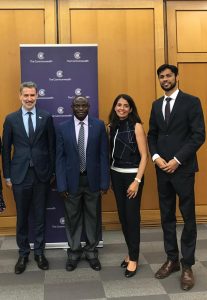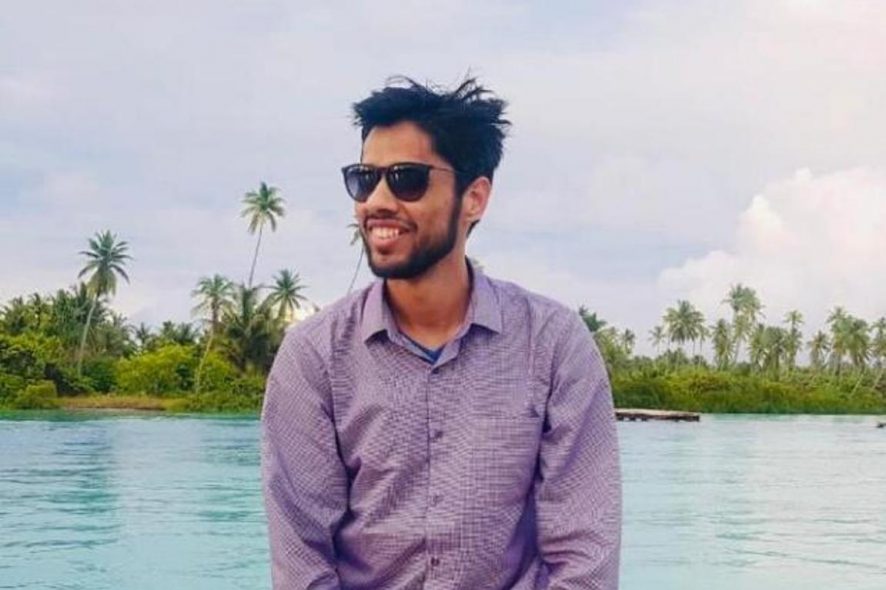Mr. Yashasvi Nain who is an alumnus of Rajiv Gandhi National University of Law, Punjab. He completed his Masters from the prestigious Geneva Academy of International Humanitarian Law & Human Rights in the year of 2014 as a Hans Wilsdorf Scholar. Currently, Mr. Nain is an international civil servant working at the Commonwealth Secretariat as Human Rights Adviser. He has been interviewed by EBC/SCC Online Student Ambassador Vijaya Singh who is currently pursuing her law from RGNUL.
- We would love to know about your career trajectory to help other law students who wants to pursue international law.
Thank you for inviting me for this interview. Initially, I wanted to pursue a career in the field of medicine and worked towards that during my senior secondary schooling years. However, after taking note of certain social incidents that took place at the time along with closely observing the work of my father who is a lawyer made me understand that law could be an effective instrument of bringing about social change and which can be wielded as both shield and sword. The knowledge of law creates awareness about one’s rights, which in turn enables protection of our interests as well as being able to help others who are in vulnerable positions. For these reasons and more, I chose to study law. After working for many years on various human rights issues, I continue to believe that law is a powerful tool to fight against all forms of injustice and it has the ability to promote accountability, end violence and bring about sustained social change in society.
After interning at law firms, courts, NGOs, traineeship at the Supreme Court of India and inter-governmental organizations, I realised that international law is a fieldI would like to pursue. Since a master’s degree is often a pre-requisite to work in international law, I applied to the Geneva Academy of International Humanitarian Law and Human Rights.
After the Geneva Academy, I worked with Office of the UN High Commissioner for Human Rights (OHCHR) on wide range of human rights issues; then I undertook an UNHCR field project where I worked on the issue of statelessness among Tamil Refugees in refugee camps in Tamil Nadu.
Subsequently, I worked with the Commonwealth Human Rights Initiative (CHRI), an International NGO, as head of the International Advocacy Program, as well as the UN Representative of CHRI in Geneva. At CHRI, I led advocacy initiatives on the civil and political rights violations in various Commonwealth countries at the Geneva based UN Human Rights Council (HRC). An interesting aspect of my time at CHRI was my work and engagement with Small Island Developing States as well as Least Developed Countries. The Civil Society Organisation (CSO) in these countries face many obstacles in effectively engaging with the HRC and its mechanisms. I designed, developed and set up a project involving capacity building and training of the CSO from three Commonwealth Small States from the Pacific: Fiji, Vanuatu, and Papua New Guinea.
Currently, I work at the Commonwealth Secretariat.
- How has the experience of studying in Rajiv Gandhi National University of Law, Punjab contributed to your interest in International Law?
My time at RGNUL was an excellent and enriching experience for me. It remains a special place since it was here that I had my first brush with international law. In my early days at the law school, I wanted to be a litigating lawyer and follow in my father’s footsteps. However, as fate would have it,it was Late. Prof. S.R.S. Bedi, who, after serving at International Court of Justice, joined RGNUL and instilled the passion and drive to pursue international law and build my interest in this field eventually. I consider him to be my academic mentor.
My pursuit of international law, as a prospective field of study, is a rather uncommon choice in India, given the general impression of its ‘intangibility’. It was after persistent efforts of certain like minded batchmates along with support from Prof Bedi, that we managed to convince our University authorities to introduce international law as a specialization subject envisioned to meet the highest standards of scholarship. Under the aegis of Prof Bedi, we started taking up research projects and conducted seminars on international law and human rights. You can say that was my first step towards the pursuit of international law.
Sadly, we lost Prof. Bedi even before our graduation.As a testament to his profound memory, I started the organization called Human Dignity International. It was an organization which was created to bring to life Prof. Bedi’s vision of disseminating knowledge about the concept of “Human Dignity”in international governance structures and promoting research on it. Human Dignity International’s activities were not restricted to the theoretical study of Human Dignity, but also encompassed the study of Public International Law.
- You completed your Masters in the field of Public International Law, International Humanitarian Law & International Human Rights Law from the Geneva Academy. Also, your views in regards to the difference in educational systems as prevalent in India vis a vis Geneva as well as the importance of international law as career for law students?
As I mentioned earlier, given the expanse and dynamism of international law, in order to deal with the complexity of global issues, further studies in international law would be an imperative. I felt that an LLM with a specialisation in IHL and IHRL from the prestigious Geneva Academy – where academic rigour is unrivalled, and which provides various interdisciplinary modules – would be a vital step towards realising my ultimate goal. Geneva, being the so-called world capital of human rights, afforded me the necessary global platform to pursue my intellectual drive, refine my knowledge and skills in my areas of interest and gave me the opportunity of learning from and interacting with the best legal minds across the globe.
Rather than focusing on the theoretical aspect alone, the Geneva Academy provided a practitioner’s outlook. The faculty at the Academy includes Professors who are regularly engaging with the UN system, judges from international courts, and officials from the United Nations. I was able to imbibe a clinical perspective towards international law, which has been important in shaping my career so far.
I think that international law do not come as a first choice for law students in India. Several reasons could be attributed to this:there is a lack of information about the possible career options in the field, an absence of a specialisation course at the Universities, and alack of guidance available to students on how to approach this field. Another important factor is the cost do an LLM, which is often supplemented by internships that may be unpaid to get a foot inside the UN system. For these reasons, students from developing countries often have to rely on scholarships.
TIPS TO STUDENTS: I would suggest students to start working on the applications at least a year before their graduations and look for possible funding or scholarships. It is easy to miss out application deadlines when students start at the last moments. Furthermore, I would strongly advise students to reach out to their alumni and to approach people who are working in the field who will certainly be happy to guide them. Also online LLM is a cheaper way to get a degree, especially during COVID time.
With the advent of globalization, disputes are nowadays not just limited to national laws but rather involve regional and international treaties as well obligations of countries arising out of those treaties. Therefore, international lawyers are in demand now more than ever before. At the very basic level, there is need to spread awareness among students about the career opportunities in international law. I also believe that we need to strengthen academic engagement on international law and elevate the level of scholarship.
- We take inspiration from you having achieved so many milestones at such a young age. We wish to know what has motivated you to keep moving ahead in life.
I believe that you have to be passionate about the field you are working in, and be patient to achieve your goals. Though the dynamic nature of international law drives me forward, the opportunity to help the vulnerable people, is a key factor which brings me satisfaction and keeps me motivated to continue working in human rights field. Also, opportunity to work in the field and participate directly in strengthening rule of law and human rights protection mechanisms as well as promoting accountability, makes my work more meaningful and relevant.
Furthermore,I was fortunate to have amazing mentors who helped me at every stage through their motivation and guidance. I was equally blessed to receive supportive and like minded friends with who I could discuss about the career and challenges ahead and how to tackle those obstacles.
- Please tell us more about your current role at the Commonwealth Secretariat?
I am based at the Permanent Delegation of the Commonwealth to the UN at Geneva. Primarily my work is to support Commonwealth countries to have an effective engagement with the Geneva based UN Human Rights mechanism. Particularly I work with the Commonwealth Small States (there are 32 Small States in the Commonwealth) to enhance their engagement with the UN Human Rights Council and its mechanisms. For instance, I worked with and provided support to government of Grenada, Dominica, Kiribati, Guyana etc…
I find this role extremely interesting, as it is challenging for small delegations consisting of only a few diplomats, to cover work of a great varieties of UN agencies based in Geneva, Particularly, to engage with HRC mechanisms, follow discussions on key resolutions, and participate in informal consultations. Therefore, we provide much needed technical expertise to these countries to effectively bridge this gap.
I also work closely with the Commonwealth parliaments and national human rights institutions as they have a significant role to play in the recognition and enforcement of human rights.









I am looking for Human Rights Lawyer to present my case against the Spanish Ministry of Justice in the Human Right Court.
For more details please mail me and we chat.